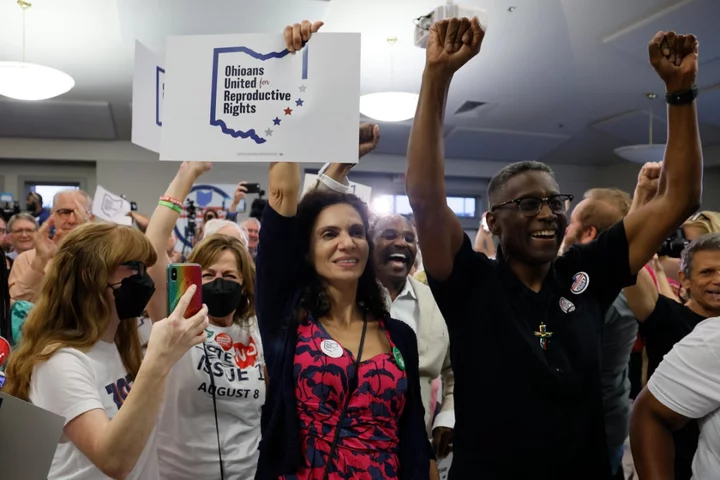
Abortion rights advocates win major victory in Ohio as voters reject GOP plan to thwart ballot measure
Ohio voters have resoundingly rejected a measure that would make it more difficult to amend the state’s constitution, a proposal that Republican officials bluntly admitted was an effort to kneecap an upcoming ballot measure asking voters to enshrine a right to abortion care. That proposal has failed, with roughly 65 per cent of the vote tallied by Tuesday night after polls had closed, according to projections from the Associated Press. Issue 1 would have required that proposed amendments to the state constitution receive at least 60 per cent of the vote, raising the threshold substantially from a current simple majority vote. It also would have increased the minimum number of petition signatures that groups would have to collect before qualifying an issue to get on a ballot. The proposal’s failure means that a November referendum on abortion rights will need only 50 per cent of the vote to enshrine those protections into the state’s constitution, a major victory for abortion rights advocates and democratic campaigns in the aftermath of the US Supreme Court’s decision to strike down Roe v Wade. President Joe Biden called the measure a “blatant attempt to weaken voters’ voices and further erode the freedom of women to make their own health care decisions.” “Ohioans spoke loud and clear, and tonight democracy won,” he said in a statement. Within the last year, voters have also turned out in record numbers to protect abortion rights in California, Kansas, Michigan and Vermont, underscoring the overwhelming unpopularity of the Supreme Court’s decision and the volatile landscape for reproductive healthcare in its wake, while scrambling anti-abortion campaigns from Republican officials emboldened by the ruling. Issue 1 campaign Protect Our Constitution was largely supported by GOP mega-donor and Illinois businessman Richard Uihlein. A coalition of abortion right, civil rights and democratic advocacy groups joined a No On Issue 1 campaign. “Tonight was a major victory for democracy in Ohio,” the group said in a statement following projections of the measure’s defeat. “The majority still rules in Ohio, and the people’s power has been preserved – because Ohio voters showed up and overwhelmingly voted down Issue 1.” Ohio voters saw the proposal for “what it was: a deceptive power grab designed to silence their voices and diminish their voting power,” the group added. Kelly Hall, executive director of the Fairness Project, said the results mark an “incredibly profound and inspiring day for democracy”. “When faced with the choice of whether to allow politicians and special interests to consolidate power and strip voters of their rights, Ohioans fought back,” she said in a statement. “The defeat of Issue 1 should send a clear message to other extremist officials around the country that democracy will not die; people are ready to defend their rights against blatant attacks like Issue 1.” The upcoming proposal for a constitutional amendment in November will ask Ohio voters whether “every individual has a right to make and carry out one’s reproductive decisions.” After the Supreme Court’s ruling in Dobbs v Jackson Women’s Health Organization last June, Ohio lawmakers swiftly outlawed most abortion after roughly six weeks of pregnancy, a law that is currently suspended by a state court injunction but could be reinstated by the state Supreme Court. A vote to enshrine abortion rights in the state’s constitution would effectively overrule any such law. Abortion rights advocates and providers have warned that Ohio’s ban, which does not include exceptions for pregnancies from rape or incest, ignited a healthcare crisis that endangered patients and their families across the state, forcing people to seek care hundreds of miles out of state and navigate complicated legal and medical minefields while experiencing pregnancy complications. Ohio Republicans initially canceled August elections altogether, which have historically low turnout. But in May, they reversed that decision to put Issue 1 on the ballot – a decision that appears to have backfired for them. Nearly 600,000 Ohio voters cast their ballots early, with voters reporting busy polling locations across the state on election day. Read More Texas judge sides with women after harrowing testimony over anti-abortion law DeSantis won’t rule out national abortion ban but suggests there’s no ‘mileage’ left in Congress
2023-08-09 11:28

Abortion rights advocates push for 2024 ballot initiative in Arizona
Abortion rights advocates plan to ask Arizona voters to create a constitutional right to abortion
2023-08-09 06:25
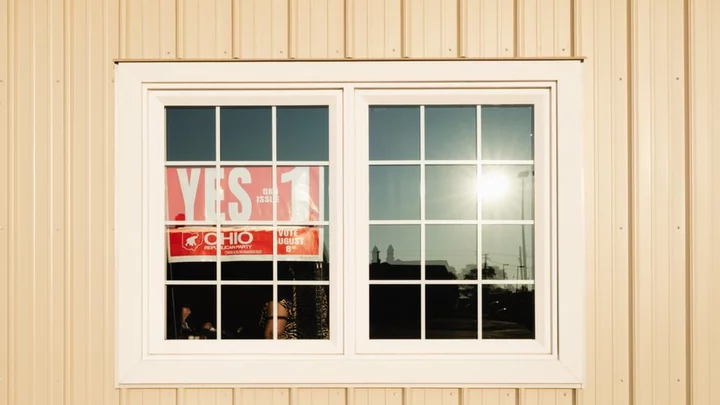
What is Ohio's Issue 1- and why is the vote so controversial?
A seemingly tedious constitutional amendment could have a significant impact on abortion rights.
2023-08-09 01:57

Proposed constitutional change before Ohio voters could determine abortion rights in the state
Ohio concludes a hastily called and highly charged special election Tuesday, a contest that could determine the fate of abortion rights in the state and fuel political playbooks nationally heading into 2024. On the ballot is Issue 1, a proposal to raise the threshold for passing future changes to the state's constitution from a simple majority to 60%. But more passionately in the sights of the proposal's backers — including Republican officeholders — is a proposed constitutional amendment on the November ballot that calls for enshrining access to reproductive care in the state's foundational document. The measure was clearly resonating with voters, who turned out in huge numbers during the early voting period, which ended Sunday. The number of advance ballots cast — a combination of mail and early in-person ballots — hit nearly 700,000, more than double the early vote during the state's two previous midterm primary elections in 2022 and 2018. Ohio's August elections have historically focused on local issues and been plagued with chronically low turnout. The Republican lawmakers who backed Issue 1 maintained that the measure was not about thwarting the fall abortion amendment, despite reinstating an August special election just like the ones they had only recently voted to eliminate. Raising the bar for passing citizen-led constitutional amendments could make it difficult, if not impossible, for the fall proposal to succeed, based on polling figures. Voters in several states, even deeply conservative ones, have affirmed abortion rights since the U.S. Supreme Court overturned Roe v. Wade last year, though usually with less than 60% of the vote. AP VoteCast polling last year found that 59% of Ohio voters say abortion should generally be legal. Out-of-state money has poured into both sides of the contest over the 60% threshold, even as both supporters and opponents say one of their main goals is to keep special interests from having more influence over state policy than average Ohioans. The campaign in favor of Issue 1, Protect Our Constitution, has told voters that raising the threshold will keep deep-pocketed interest groups from pushing redistricting, gun control and minimum wage policies on Ohio. One Person One Vote, the opposition campaign, argues that raising the threshold for passing future amendments would prioritize the interests of Ohio's increasingly conservative GOP supermajority at the statehouse over those of everyday voters. But abortion rights are at the epicenter of the fight, as Ohio and other states have been given control of their own abortion policies following the Supreme Court overturning Roe v. Wade last summer. Ohio's ban on most abortions had been placed on hold under Roe and then allowed to take effect briefly after the court overturned it. Since then, it has been frozen again while a challenge alleging it violates the state constitution plays out. The abortion amendment would give individuals the right to make their own reproductive health care decisions, including on contraception, fertility treatment, abortion and miscarriage care, until a fetus is viable outside the womb. At the same time, a broad bipartisan coalition opposes Issue 1 for other reasons. Former Ohio governors and attorneys general of both parties have come out against the constitutional change, calling it poor public policy. If passed it would reverse 111 years of direct democracy that has the potential to affect future citizen-led ballot efforts. Protect Women Ohio, the campaign against the fall abortion question, has spent millions on the August election — airing ads suggesting the measure not only codifies abortion, but could pressure children into receiving gender-affirming care and undercut parental rights. Several legal experts have said there is no language in the amendment supporting the ads' claims, but it follows a pattern through this election cycle of misinformation and fear-mongering being used to sway voters. Issue 1 opponents have aired ads and mobilized a large coalition, including voting rights, labor, faith and community groups, as well as the state Democratic Party. It was because of chronically low turnout that lawmakers voted just last year to scrap summer elections, prompting an unsuccessful lawsuit alleging this year's August special election violated the new law and calling further into question if it was brought back solely to thwart abortion rights for Ohioans. ___ The Associated Press receives support from several private foundations to enhance its explanatory coverage of elections and democracy. See more about AP’s democracy initiative here. The AP is solely responsible for all content. ___ Samantha Hendrickson is a corps member for the Associated Press/Report for America Statehouse News Initiative. Report for America is a nonprofit national service program that places journalists in local newsrooms to report on undercovered issues. Read More Ukraine war’s heaviest fight rages in east - follow live Charity boss speaks out over ‘traumatic’ encounter with royal aide Attacks at US medical centers show why health care is one of the nation's most violent fields Ohio election that revolves around abortion rights fueled by national groups, money Taylor Swift bracelet-trading trend makes way to Women’s World Cup in Australia
2023-08-08 12:25
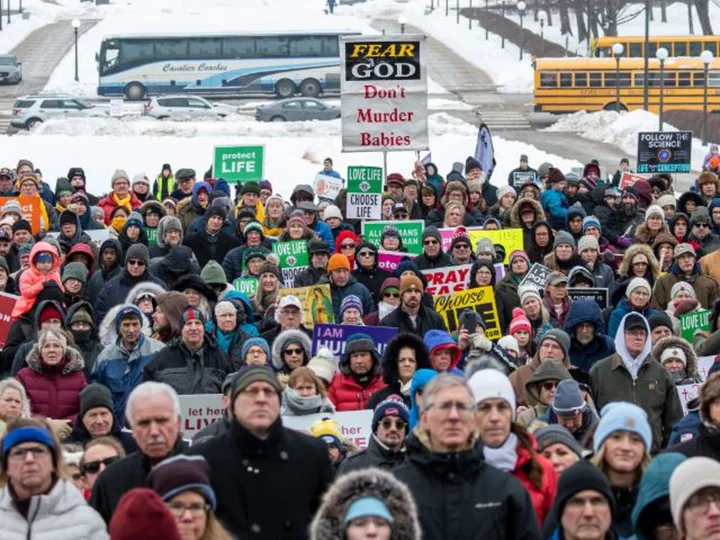
The anti-abortion movement is fractured over what it wants from its first post-Roe GOP presidential nominee
Bernie Hayes has spent most Mondays since the overturning of Roe v. Wade meeting with friends outside of an Iowa Planned Parenthood trying to stop abortions one at a time. He huddles monthly with other like-minded activists plotting more wholesale paths to halting the procedure.
2023-08-07 04:16
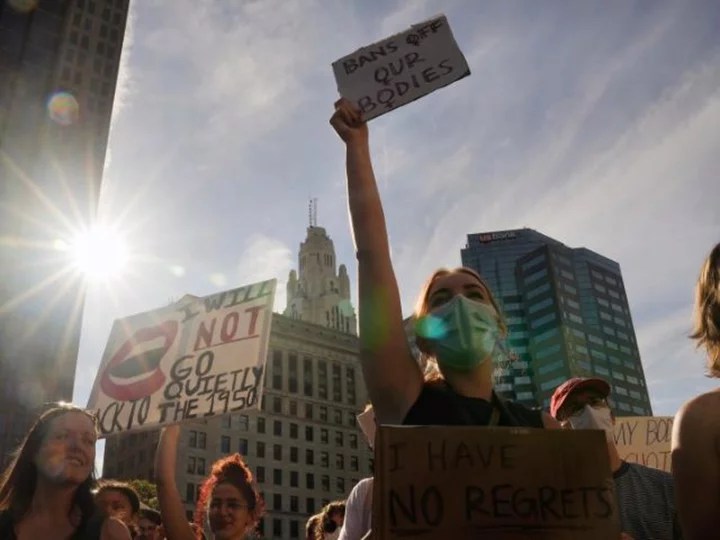
Abortion rights amendment qualifies for November ballot in Ohio
Ohio Secretary of State Frank LaRose announced Tuesday that organizers submitted enough valid signatures to put an amendment on the November ballot to enshrine abortion rights in the state's constitution.
2023-07-26 05:49
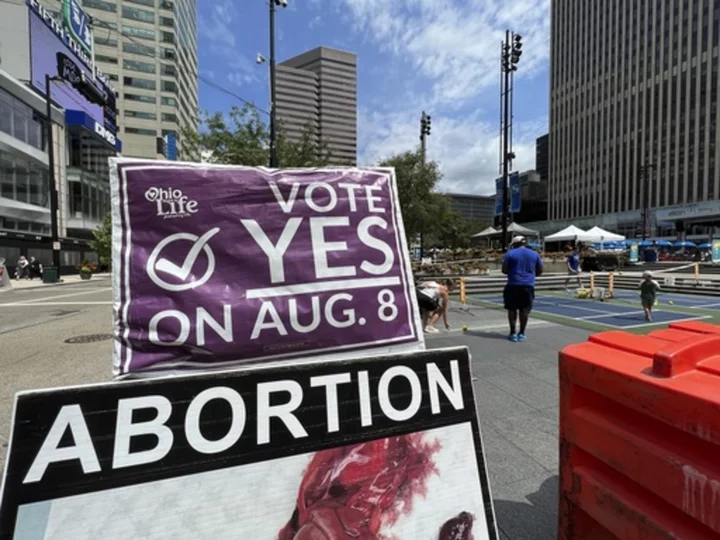
Abortion messaging roils debate over Ohio ballot initiative. Backers said it wasn't about that
The fraught politics of abortion have helped turn an August ballot question in Ohio that would make it harder to change the state constitution into a cauldron of misinformation and fear-mongering
2023-07-25 00:00

UK political parties are getting the jitters over green policies after a special election verdict
Environmentalists are cautioning Britain’s main political parties not to water down their climate change promises
2023-07-23 18:51

Harris heads to Florida ready to forcefully condemn state's new Black history standards
Vice President Kamala Harris will travel Friday to Jacksonville in a last-minute trip to forcefully condemn a newly approved set of standards for teaching Black history by the Florida Board of Education, directly wading into one of the cultural flashpoints that have assumed new prominence ahead of the 2024 election.
2023-07-21 23:15
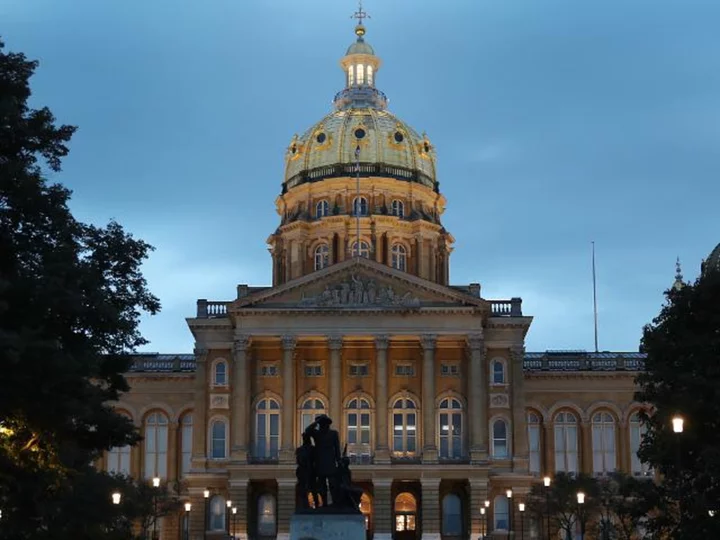
Iowa's special session places abortion at forefront in 2024 GOP primary
Iowa's legislature will kick off a special session Tuesday aimed at banning abortion in most cases after about six weeks of pregnancy, elevating the issue in a state blanketed by 2024 presidential contenders who have sought to avoid the kinds of specifics the Republican-led state House and Senate are poised to consider.
2023-07-11 19:18
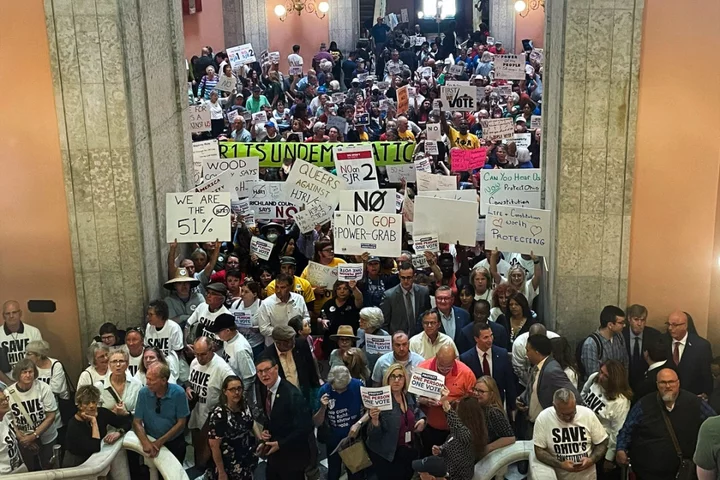
Ohio voters are likely to decide the future of abortion rights
Voters in Ohio will likely decide if the state’s constitution should enshrine the right to abortion care, after abortion rights advocates collected tens of thousands of signatures on a petition to put the issue on ballots this fall. If certified, those 710,000 signatures – roughly 300,000 more than required by state law – will place a proposed constitutional amendment asking whether “every individual has a right to make and carry out one’s reproductive decisions.” A statewide vote for abortion protections follows a wave of anti-abortion laws in the aftermath of the US Supreme Court’s decision to strike down a constitutional right to care last year. More than a dozen states, mostly across the entire US South, have effectively outlawed most abortions. But the Supreme Court decision to overturn the half-century precedent under Roe v Wade also fuelled efforts to protect abortion rights across the country, including in neighboring Michigan and Kentucky, where voters in both states voted to support abortion rights in ballot measures last year. After the Supreme Court’s ruling, Ohio lawmakers swiftly outlawed most abortion after roughly six weeks of pregnancy, a law that is currently suspended by a state court injunction but could be reinstated by the Ohio Supreme Court. A vote to enshrine abortion rights in the state’s constitution would effectively overrule any such law. Abortion rights advocates and providers have warned that Ohio’s ban, which does not include exceptions for pregnancies from rape or incest, ignited a healthcare crisis that endangered patients and their families across the state, forcing people to seek care hundreds of miles out of state and navigate complicated legal and medical minefields while experiencing pregnancy complications. The petition launched by Ohioans for Reproductive Freedom and Ohio Physicians for Reproductive Rights will head to the secretary of state, which has until 25 July to determine the validity of the signatures. The campaign launched with an open letter on 7 July of last year signed by hundreds of physicians rejecting the state’s anti-abortion law. “Over the past year, support for the amendment has grown exponentially thanks to our partners at [Ohioans for Reproductive Freedom], the thousands of volunteers who gathered signatures in communities across the state, and the hundreds of thousands of people who added their names to our petitions,” according to a statement from Dr Lauren Beene and Dr Marcela Azevedo, co-founders of Ohio Physicians for Reproductive Rights. “Today, the message we and they are sending is loud and clear: ‘let the people decide,’” they said. The campaign will magnify the role of Ohio – a state that voted for Donald Trump by more than 8 percentage points over Joe Biden in 2020 – in the 2024 presidential campaign and the renewed battle for abortion rights surrounding it, as Republican candidates and members of Congress weigh federal legislation that would outlaw or severely restrict abortion access nationwide. President Biden and Democratic candidates have signalled the central role that abortion rights protections will play in upcoming campaigns, alongside their warnings of a GOP-controlled White House and Congress legislating on abortion at the national level. Last year, a record number of voters in Kansas – a state that Mr Biden lost by more than 15 percentage points in 2020 – turned out for an election to reject a Republican-drafted amendment that would strip abortion rights from the state’s constitution, the first test for abortion rights put directly to voters after the ruling in Dobbs v Jackson Women’s Health Organization. That measure was shot down by nearly 20 percentage points, sending a resounding message that underscored the immense unpopularity of the Supreme Court’s decision. The president has repeatedly invoked that election victory in remarks supporting abortion rights in the months that followed, stating that the Supreme Court “practically dared women in this country to go to the ballot box and restore the right to choose,” and that anti-abortion lawmakers vastly underestimated how Americans would respond. Following the outcome in Kansas, Mr Biden pointed to the justices’ own writing in the Dobbs decision: “Women are not without electoral or political power.” “They don’t have a clue about the power of American women,” he said. “In Kansas, they found out women and men did exercise their electoral political power with a record turnout.” Read More Man sentenced to life in prison for rape of 10-year-old girl in Ohio abortion case that drew national attention Senator who once worked at a Planned Parenthood warns that Republicans are planning a national abortion ban One year after Roe v Wade fell, anti-abortion laws threaten millions. The battle for access is far from over
2023-07-06 22:54

The Supreme Court just handed Joe Biden a series of setbacks. It may have also given Democrats new motivation to reelect him
President Joe Biden wasn't planning to take questions on Thursday. His helicopter was waiting outside on the White House's South Lawn.
2023-07-01 12:15
